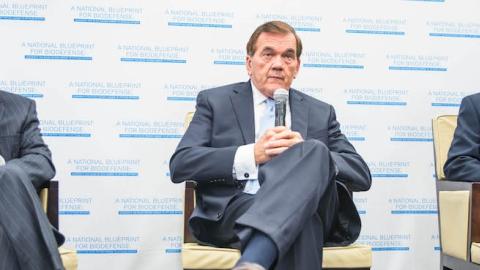Preface:
To the President, Congress, and the American People:
The United States is underprepared for biological threats. Nation states and unaffiliated terrorists (via biological terrorism) and nature itself (via emerging and reemerging infectious diseases) threaten us. While biological events may be inevitable, their level of impact on our country is not.
We convened the Blue Ribbon Study Panel on Biodefense to assess how much has been done to address the biological threat and what remains undone. Despite significant progress on several fronts, the Nation is dangerously vulnerable to a biological event. The root cause of this continuing vulnerability is the lack of strong centralized leadership at the highest level of government.
Crisis after biological crisis has forced the United States to act. Naturally occurring threats such as influenza, Ebola, and Chikungunya are bypassing borders to emerge in nations oceans away, and exact a continued toll. The Islamic State of Iraq and the Levant (also known as ISIL and Da’esh) is devastating the Middle East while espousing the value of biological weapons for their ability to cause massive loss of life. The U.S. government has mishandled extremely dangerous viruses and bacteria in some of its highest level laboratories. The Nation lacks the leadership, coordination, collaboration, and innovation necessary to respond.
This Panel (through public meetings, targeted interviews, and extensive research) examined the national state of defense against biological attacks and emerging and reemerging infectious diseases, of the order that could cause catastrophic loss of life, societal disruption, and loss of confidence in our government. We scrutinized the status of prevention, deterrence, preparedness, detection, response, attribution, recovery, and mitigation – the spectrum of activities deemed necessary for biodefense by both Republican and Democratic Administrations, and many experts outside of government. We identified substantial achievements, but we also found serious gaps and inadequacies that continue to leave the Nation vulnerable to threats from nature and terrorists alike.
Successive Presidents, beginning with William J. Clinton and followed by George W. Bush and Barack H. Obama, enacted policies intended to strengthen national biodefense. As a result, many federal departments and agencies took action and the majority of these programs received bipartisan congressional support. Yet fourteen years after the last report of the U.S. Commission on National Security/21st Century, eleven years after the report of the National Commission on Terrorist Attacks upon the United States, ten years after the report of the Commission on the Intelligence Capabilities of the United States Regarding Weapons of Mass Destruction, and seven years since the report of the Commission on the Prevention of Weapons of Mass Destruction Proliferation and Terrorism, the insufficiency of our myriad and fragmented biodefense activities persists because biodefense lacks focused leadership. Capable individuals oversee elements at the department and agency levels, but no steward guides them collectively.
As leaders in past Administrations and Congresses, we, the members of the Panel, had a role in our national biodefense and we share responsibility for its shortcomings. Our intent is to help remedy the correctable shortfalls by identifying specific short-, medium-, and long-term programmatic, legislative, and policy actions in this report. We urge those in leadership positions to implement our recommendations with utmost haste. Lives are in the balance.
We provided this charge to ourselves – without a commission from Congress or the President – and tried not to duplicate the work of previously mandated commissions and appointed panels. Instead, we built on and contemporized their insights, observations, and recommendations. While we originally intended to assess both biological and chemical threats, we came to believe that the more immediate concern regarding loss of life is the biological threat and that in focusing on it, there will be collateral benefits for dealing with the chemical threat as well.
Biodefense touches many aspects of society, falling within the purview of national security, homeland security, public health security, and economic security. As such, it requires an enterprise approach – eliminating stovepipes; transcending agency-centric activity; drawing upon stakeholders throughout government, academia, and the private sector; and recognizing the extraordinary breadth of the challenge – to provide flexible solutions that address the full spectrum of the threat. Most importantly, the Nation needs an overarching leader who recognizes the severity of the biological threat and possesses the authority and political will to defend against it. This top-level leader, together with leaders throughout the enterprise, must guide efforts and ensure that the combined impact of biological threats, vulnerabilities, and consequences are managed using a common biodefense strategy.
As former Secretary of the Navy Richard Danzig told us, “We don’t really get to choose what we have to prepare for.” We have no choice – the Nation must take action to defend against the biological threat. We have done much already, but we need the leadership only a top-level official can bring to bear to optimize the biodefense enterprise. We believe that our recommendations will make America more secure, and we will continue to monitor actions taken to improve our national biodefense posture. If you take and demand action now, you can save lives. There is no greater calling or responsibility.















